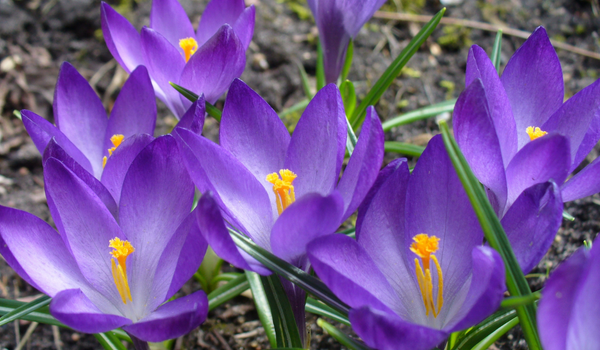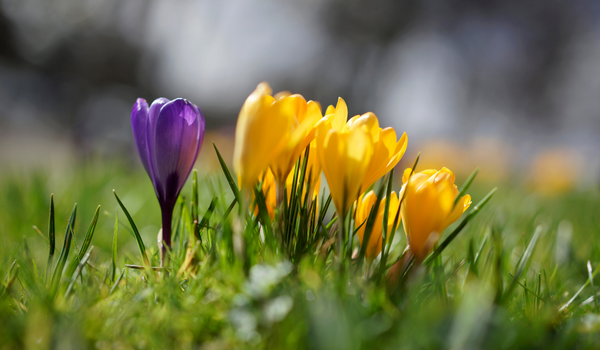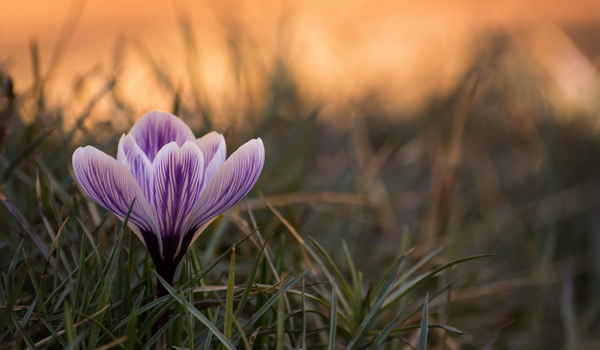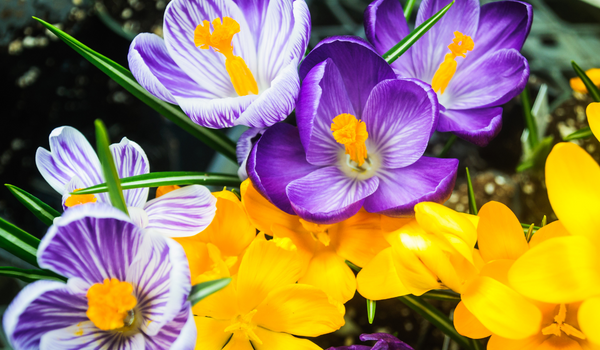How to plant Crocus? - The ultimate planting guide for Crocuses
Are you considering growing tulips to add vibrant colors to your garden or indoor space? Crocuses, with their stunning array of hues, are a delightful addition to any garden landscape. In this comprehensive guide, we’ll walk you through everything you need to know about planting tulips to ensure their successful growth and blooming.
To ensure the best growth and vibrant blooms, be sure to check out our high-quality crocus bulbs.
How should Crocus bulbs be planted?
To ensure vibrant blooms, planting Crocus bulbs requires attention to timing and soil conditions. Choose a well-draining location receiving ample sunlight. Plant bulbs in autumn, about 2-3 inches deep and 3-4 inches apart, with pointed ends facing upward. Loosen the soil to allow easy root growth and consider adding compost for enriched nutrients. Water thoroughly after planting to settle the soil and promote initial growth. These resilient bulbs thrive in diverse environments but prefer slightly acidic to neutral soil. With proper planting depth, spacing, and optimal growing conditions, Crocus bulbs will reward your garden with charming, early spring blossoms in a beautiful array of colors.
If you're interested in learning more about how to grow crocus, check out our detailed guide how to grow crocus for expert tips and advice. To ensure your crocuses thrive, it's important to know how to care for crocuses properly. For expert tips, check out our guide on how to care for crocuses.

Best time for Crocus planting
The optimal time for planting Crocus bulbs is during the fall season, ideally between late September and early November, before the first frost sets in. This timing allows the bulbs to establish strong roots before the winter chill arrives. Choose a well-draining location with partial to full sunlight, and plant the bulbs approximately three inches deep with a spacing of two to three inches apart. Crocus bulbs thrive in cool soil conditions, which is why autumn planting is recommended. By planting during this season, you ensure these vibrant, early spring bloomers will burst forth with their delightful colors once the weather warms up.
Pre-planting soaking for Crocus bulbs
Pre-planting soakment, while not mandatory, can significantly benefit Crocus bulbs, expediting their blooming process. Soaking the bulbs for a few hours prior to planting allows them to absorb moisture, promoting quicker growth and earlier flowering. This process aids in hydrating the bulbs, enhancing their ability to establish roots and initiate growth promptly once planted. To perform this, place the Crocus bulbs in lukewarm water for around 2-4 hours before planting them in well-draining soil. While not compulsory, this technique can contribute to earlier and more vibrant blooms, elevating your garden's charm with these delightful early spring flowers.
Optimal locations for planting Crocuses
Crocuses thrive in well-drained soil and flourish best when planted in areas receiving ample sunlight. Optimal locations for planting crocuses include gardens, rockeries, or under deciduous trees where they can enjoy partial shade during their blooming season. These bulbs prefer soil with good drainage, so ensure it's not waterlogged. When planting, choose a spot with sufficient airflow to prevent fungal diseases. Crocuses also do well in containers, adding vibrant hues to balconies or patios. For best results, plant them in the fall.

Planting depth for Crocus bulbs
When planting Crocus bulbs, ensure a planting depth of around 3 to 4 inches (7.6 to 10 cm). These small but vibrant bulbs thrive best when planted in well-draining soil. Aim to place the bulbs with the pointed ends facing upward, allowing them ample space for growth and development. The ideal depth provides protection against extreme temperatures while allowing the bulbs to establish strong roots. To enhance their visual impact and protect them from pests or adverse weather conditions, consider planting in clusters or drifts. Remember, proper planting depth ensures healthy growth and stunning displays of these delightful early bloomers.
Soil preparation tips for Crocuses
For optimal growth and vibrant blooms, proper soil preparation is crucial when planting Crocuses. These resilient bulbs thrive in well-draining soil enriched with organic matter. Begin by selecting a sunny or partially shaded area and ensure the soil is loose and not compacted. Loosen the soil to a depth of around 6 inches, removing any debris and weeds. Incorporate compost or well-decomposed organic matter to improve soil fertility and drainage. Aim for a soil pH between 6.0 and 7.0, ensuring a slightly acidic to neutral environment. Additionally, consider adding a layer of mulch after planting to help retain moisture and regulate soil temperature, ultimately fostering healthy Crocus growth.
Determining the number of Crocus bulbs to plant
The number of Crocus bulbs to plant largely depends on the desired visual impact and space available. Generally, a good rule of thumb is to plant Crocus bulbs in clusters or groups rather than as singular specimens. For a vibrant display, aim for at least 15 to 20 bulbs per square foot. However, smaller spaces or containers might require fewer bulbs to avoid overcrowding and allow each flower to flourish. Consider the specific variety, as larger or smaller types may necessitate adjustments in planting density. Balancing aesthetics and spacing is crucial to achieve a stunning and balanced display of these beautiful spring bloomers.

Receiving and handling Crocus bulbs: essential steps
When receiving Crocus bulbs, promptly inspect the package for any signs of damage and ensure they are firm and free from mold or soft spots. Upon arrival, store bulbs in a cool, dry place until planting time, ideally in a well-ventilated container. Prior to planting, examine each bulb carefully and discard any damaged or unhealthy ones. For optimal results, plant bulbs immediately after receiving them or store them in a breathable container filled with peat moss or dry soil in a cool location until planting. Proper handling and timely planting ensure healthy growth and vibrant blooms for these delightful spring flowers.
Indoor planting of Crocus Bulbs
Indoor planting of Crocus Bulbs is a delightful way to bring early spring blooms into your home. Begin by selecting a shallow container with drainage holes, filling it with well-draining potting mix, and placing the bulbs about 2-3 inches apart and 2-3 inches deep with the pointed side up. Store the planted container in a cool location for 8-12 weeks to simulate the bulbs' chilling period, ensuring they receive indirect sunlight. Water sparingly, keeping the soil slightly moist but not waterlogged. Once shoots emerge, move the container to a bright, sunny spot, continuing to water moderately.
Planting dried-out Crocus bulbs
When planting dried-out Crocus bulbs, take several steps to ensure successful growth. First, rehydrate the bulbs by soaking them in lukewarm water for a few hours before planting. Choose a well-draining soil mix rich in organic matter to promote healthy root development. Plant bulbs about 3 inches deep and 3-4 inches apart, ensuring the pointed end faces upwards. Incorporate a layer of compost or bulb fertilizer into the soil to provide essential nutrients. Ensure the planting area receives adequate sunlight, ideally in well-drained soil to prevent waterlogging. Regular watering, especially during the growing season, will aid in bulb growth. Remember to mulch the area to retain moisture and protect bulbs during colder months.
It is important to not mistake dried-out bulbs for dead bulbs. You recognize non-viable bulbs often when they show signs such as extreme dryness, mold, soft spots, or evident rot.

Growing Crocuses in containers
Growing Crocuses in containers is a delightful way to enjoy these vibrant blooms. Start by selecting a well-draining container that's at least 6 inches deep and fill it with a high-quality potting mix. Plant the Crocus bulbs with the pointed end facing up, spacing them about 2-3 inches apart. Ensure the containers receive ample sunlight, preferably in a location with partial shade. Water the bulbs moderately, allowing the soil to dry slightly between waterings. During the dormant season, store the containers in a cool, dry place.
Ground vs. pots: where do Crocuses thrive better?
Crocuses, vibrant harbingers of spring, thrive remarkably well both in garden beds and containers, each offering distinct advantages. Planted in well-draining, loamy soil, crocuses flourish in garden beds, benefitting from the natural space to multiply and spread. Their naturalizing tendencies make them ideal for open ground, adding bursts of color to lawns, borders, or rock gardens. On the other hand, planting crocuses in pots offers greater control over soil conditions and placement, making them perfect for balconies, patios, or indoor settings. Containers provide excellent drainage and prevent soil compaction, ensuring optimal growth.
Quantity of Crocuses for container planting
When planting Crocuses in containers or pots, the number of bulbs depends on the container's size. For smaller pots, such as those with a diameter of 6 inches, you can plant around 6 to 10 Crocus bulbs for a charming display. Larger containers, with diameters of 12 inches or more, can accommodate 15 to 20 bulbs, providing a more abundant burst of color. Ensure the bulbs are spaced approximately 2 to 3 inches apart to allow proper growth. Consider mixing various Crocus varieties to create an appealing blend of colors and textures in your container garden, enhancing its visual appeal and vibrancy.
Share
